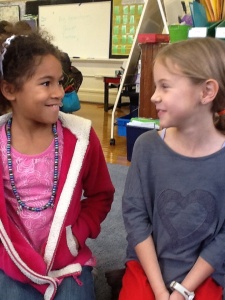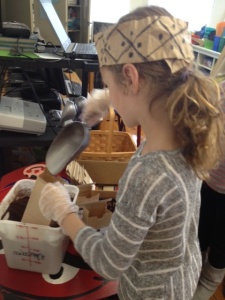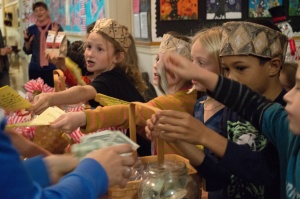“Live the questions now. Perhaps then, someday far in the future, you will gradually, without even noticing it, live your way into the answer.” Rilke
 Morning Meeting is a simple and powerful routine for building community, trust, and respect in the classroom. Every morning, sometime around 9:15, I put on piano music played by Jim Bennett, a friend and local musician. The tune is “Morning has Broken.” The music is a lovely and wordless signal for the children to put away their “Morning Start-Up” work and come to the rug.
Morning Meeting is a simple and powerful routine for building community, trust, and respect in the classroom. Every morning, sometime around 9:15, I put on piano music played by Jim Bennett, a friend and local musician. The tune is “Morning has Broken.” The music is a lovely and wordless signal for the children to put away their “Morning Start-Up” work and come to the rug.
Once gathered, we make sure that no one is left out of the circle and begin the greeting. One by one, we look into the eyes of the person sitting on our right and reach out our right hand in greeting. Other than the chain of one child saying Good Morning to another, the only sound in the room is the music. When the greeting is done, the music is turned off. In the silence that follows, I ask a question– and it is not a question with one right answer. The children go around the circle to answer or pass or agree or disagree with someone who has already spoken or elaborate upon a previous answer. I often take notes as they speak. When it comes back to me, I try to synthesize what I’ve heard and they let me know if I am on the right track.
Not all of Morning Meeting is serious. We do silly stretches or sing or play quick games that might strengthen word sense and vocabulary and math skills. There is often a book. A story. Pictures to look at. A mini-lesson. Sunlight pours through the big windows of our corner classroom and spills through the laughter in the air. My children love Morning Meeting, and if for some reason we don’t have it, they are the first to say that the day doesn’t feel right.
The day feels better when we greet each other. And honor each other. The day feels better when we begin with a question rather than a bunch of right and wrong answers. Early in our study of Mali (a state requirement), I asked a question and I did not fully know the answer: “Should teachers teach their children about suffering?” Some said yes and some said no and many were not sure. I was among the “not sure,” but I was worried about “Disney-fying” Mali by ignoring its current problems.
We forged ahead and talked about drought, famine, struggle, violence, and loss. We talked about the vulnerability of orphaned children. We were cautious. Careful. Answers took a backseat and now we were looking for solutions. Two things were clear: my children needed to be assured that they were safe and they needed to feel like they could do something to help. It is very hard to feel safe if you feel helpless. It was time to find a way to take action.
We were looking for an organization to support in some small way, but this was difficult as Mali’s government was coming apart. I wrote UNICEF in Mali and did not receive a reply. I tried the Peace Corps, too; the Peace Corps volunteers had been evacuated. Reina’s mom helped us find an organization. We researched it online. It was important for us to find an organization that helped children and enabled boys and girls get an education. We were happy to find the Zorokoro Project at www.acfacorp.org. We decided to have a bake sale to support this organization before the holiday PTA meeting. The director of the ACFA, Kadiatou Sidibe, sent each child a pamphlet about the organization. Sarah Lisk, a former student of mine who volunteers once a week, helped the children make a banner for the bake sale. The parents baked and baked and baked. Molly’s parents donated fair trade coffee from Africa for us to bag and sell.
The children worked hard. The day of the sale they scooped and measured and bagged and weighed coffee. They labeled packs of cookies and tied packages with curling ribbon. They created brochures to be handed out at the bake sale with their key talking points. Brook’s mother, sister, and grandmother came to help package and price baked goods after school (his grandmother also organized many of her friends as bakers!). My third grade colleagues pitched in: Pat Kite made Blondies and Danielle Adkins helped organize baked goods.
weighed coffee. They labeled packs of cookies and tied packages with curling ribbon. They created brochures to be handed out at the bake sale with their key talking points. Brook’s mother, sister, and grandmother came to help package and price baked goods after school (his grandmother also organized many of her friends as bakers!). My third grade colleagues pitched in: Pat Kite made Blondies and Danielle Adkins helped organize baked goods.
Miranda and Synia stayed after school to help. Children arrived early and positioned themselves for their jobs. Some stood at the entrances with brochures about the Mali project; they know the power of greeting and eye contact and personal connection; they learn it in Morning Meeting everyday. Others stood behind the table and waited. They didn’t have to wait long. James’ mother helped count money. Ainsley’s dad was there with a “square” for his Ipad so we could take credit cards. Some parents made generous donations.
These third graders were tireless; they were inspiring; and they were effective. Children  love competence, agency, completion, and success. It is part of the human engine to want to make a difference. The children of Room 204 wanted to help the children of Mali, and they did. Money continued to trickle in. The total amount came to $668. 08. With a matching grant from the Segal Family Foundation, our class raised $1,336.16.
love competence, agency, completion, and success. It is part of the human engine to want to make a difference. The children of Room 204 wanted to help the children of Mali, and they did. Money continued to trickle in. The total amount came to $668. 08. With a matching grant from the Segal Family Foundation, our class raised $1,336.16.
Later that week, I invited our question back into Morning Meeting.
“Should teachers teach their children about suffering?”
“Yes,” they said, one after another around the circle.
They elaborated:
“If you do, explain it carefully—know that sensitive kids will worry.”
“Be cautious about what you are teaching.”
“If you do, be sure you can teach how to help. It makes sense then.”
“Don’t study suffering if you can’t take action.”
“Children will feel bad if they can’t help. Carefully spread it out over time.”
“Teach gently.”
“Know that it is okay for helping to be fun.”
“Learning about the world is learning about the world. Sometimes that means learning about suffering.”
“Make sure you have reason to do it, otherwise it doesn’t make sense.”
I asked a question that we lived out together. And, once again, my children taught me the answer.


I love Morning Meeting, but the way you’ve built upon it is inspiring.
once again i’m brought to tears by you annie campbell. you continue to inspire me to just ask the question and see where it goes.
I am the grandmother of one of your students, Synia. I know how much she and her sister have benefited from your excellent teaching. May God bless you for your care and love, creativity, energy, and the way you teach the whole child, not just their brains.
Amazing. Would LOVE my children to be a part of a class like this. You are teaching these children that they, and others, matter! What a way to Pay it Forward.
this one is especially good. and timely.. for mali, as well as our own country. good job, campbell.